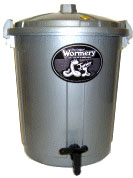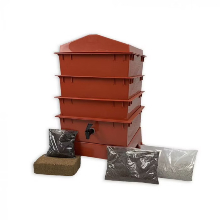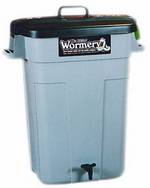Home composting and wormeries
What are home compost bins?
They are a great step forward towards more sustainable living. You can reduce your waste and convert it to compost for gardens and house plants.
Compost is a nutrient rich plant product that reduces greenhouse gases. It helps improve soil structure, maintain moisture levels and suppresses disease in plants.
They are ideal if you have a garden. All your cuttings can be made into compost that you can use on your garden plants.
What is a wormery?
They contain live worms that consume your food waste. In return, they produce compost and liquid plant food.
The worms will breed and multiply to suit how much food waste you choose to compost.
Wormeries don’t smell as the food is broken down quickly – and don’t worry, the worms won’t escape.
They are ideal if you live in a flat or have little or no garden waste.
Can you get compost bins and wormeries from the council?
Yes, at a subsidised rate, residents can order compost bins and wormeries.
Please note, we do not replace these items if they get damaged through use or wear and tear.
It is the owner's responsibility to make sure they are in a secure spot and looked after.
You can also find out about community composting for flats.
Compost bins
Limited to two per household
£13
We offer the Compost Converter to our residents. It is strong, very easy to use and does not need any assembly.
Its capacity is 220 litres. It measures 900mm (height) x 740mm (width).
What can you put in your compost bin?
| Do put these materials in | Don't put these materials in |
|---|
-
Leaves
-
Grass cuttings
-
Fruit and vegetable peelings
-
Shredded or scrunched paper
-
Small pieces of cardboard
-
Sawdust (dried)
-
Tea leaves and coffee grounds
-
Dried and crushed eggshells
-
Wool or cotton in small threads
-
Hamster and gerbil droppings
|
-
Meat or dairy produce
-
Bread, pasta and rice
-
Cooked food
-
Plant / weed seeds (these could lie dormant and grow later)
-
Thick branches
-
Diseased plant material ( it could spread to your healthy plants)
-
Citric fruit (it's too acidic and may attract flies)
-
Photo / glossy printed paper (this has too many non-natural chemicals)
-
Dog and cat manure (these carry human pathogens so must not be used)
-
Glass, plastic, and metal (they take thousands of years to break down)
|
Wormeries
Limited to one per household
We offer three types of wormeries to residents. All come complete with full instructions and a voucher to buy the worms.
When you are ready to start using it, simply post the voucher to order the worms. Then start feeding them once they arrive.
Wormeries must be looked after regularly to ensure that the worms are always busy eating new food.
Midi wormery - £21
The midi wormery can be used both indoors and outdoors.
It's ideal for flats and single or two-person households or where space is limited.
Capacity: 27 litres.
Diameter: 360 mm. Height: 430 mm

Tiger wormery - £27
The tiger wormery has 3 square stacking trays that make compost harvest easy. It can be kept outdoors. It is suitable for 3 to 4 people,
Capacity 46.5 litres.
Width: 400mm. Depth: 400mm. Height: 520mm (700mm when complete).
Due to recent high demand deliveries of the tiger wormeries are taking longer than normal. Please bear with us during this busy time.

Original wormery - £33
The original wormery is suitable for family use and can be kept indoors or outdoors.
Capacity 100 litres.
Width: 610 mm. Depth: 432mm. Height: 762mm.

What can you feed your wormery?
| Do put these materials in | Don't put these materials in |
|---|
-
Virtually all kitchen waste – peelings, cooked and uncooked vegetable scraps
-
Teabags
-
Egg shells
-
Paper kitchen towels, cardboard from toilet rolls and kitchen rolls (broken up)
-
Bread, rice and pasta
-
Cereals
-
Food leftovers from plates.
|
-
Meat and fish
-
Citrus fruits
-
Onions
-
Cheese
-
Grass
-
Cat/dog manure
- Chemical and liquid oil products
|
Do not overfeed the wormery
The food will rot and this will upset the worms and it may start to smell.
Do not put chemical and liquid oil products in the wormery. This will kill the worms.
Order your compost bin or wormery
Community composting for flats
This is one of the most sustainable ways to manage food and garden waste.
It provides environmental, economic, social and personal benefits.
It gives residents the opportunity to get involved in composting on a larger scale. It also encourages neighbours to get involved in waste reduction.
The scheme offers hotbins, wormeries and compost bins to community groups or estates that are interested.
You must have at least five volunteers to take part.
Volunteers must agree to manage the scheme and reduce the kitchen waste from entering the waste stream.
There are no extra waste collections for community composting sites
All compost and liquid fertiliser you produce should be used on-site and/or shared amongst contributors.
If you are interested, please contact recycle@towerhamlets.gov.uk
Further information
If you have questions for us about compost bins or wormeries please contact recycle@towerhamlets.gov.uk
If you are new to home composting or want to expand your knowledge, please visit Recycle Now.